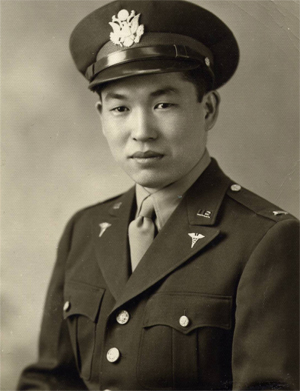
At the same time, in the U.S. laws were passed by Congress that prohibited aliens from purchasing land: these were the Alien Land Law of 1913, together with a 1920 amendment and the 1924 National Origins Immigrant Act that abruptly closed the door to all persons ineligible for citizenship. I recall that two houses down the street from us a Japanese family could only purchase a house through the proxy of an American friend.

Lt. James Yamazaki.
Meanwhile, immigrant families in Uptown flourished, and through donations by Japanese gardeners, Buddhist priests, and ordinary people, a new facility was built in 1932. However, the winds of war were already blowing in the 1930s. I could read, in daily English and Japanese papers, the news about the increasing hostility between the U.S. and Japan. "Yellow Peril" surfaced in headlines, caricatures, and commentaries.
In 1937, when I was studying at UCLA, the United States Naval ship, the Panay, was struck by a Japanese naval plane on the Yangtze River, in China. Would this ignite the war? In the early summer of 1941 President Franklin Roosevelt declared an embargo on oil. The embargo would shut off the spigot that fueled Japan's decade-long war in China. Thus, when I returned to Marquette University Medical School for the new semester, I filled out the application for the U.S. Army Reserve Corps. A week before Pearl Harbor, following clarification of my citizenship, I received my appointment as Second Lieutenant.